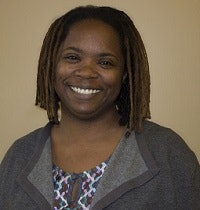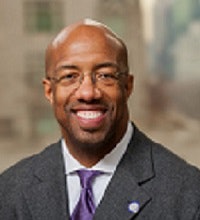This is the final in a three-part Black History Month series celebrating Black academicians and their work.
Melanye T. Price, Rutgers University
Dr. Melanye Price is an associate professor of Africana studies at Rutgers University and a well-known Black political scientist. Price’s 2016 book, The Race Whisperer: Barack Obama and the Political Uses of Race, analyzes the manner in which Obama used race strategically to gain the loyalty of his supporters.
 Dr. Melanye T. Price
Dr. Melanye T. Price“Price has written a wonderfully rich treatment of President Barack Obama’s rhetoric and his usages of race,” said author Randal Maurice Jelks. “It is a highly critical yet restrained analysis of his presidency. This book invites readers to think closely about how politicians, especially African-American politicians, use race in American national politics. More importantly, it serves as a guidebook for African-American voters and how they might assess the use of race in political rhetoric and discourse.”
Price’s research interest focuses on public opinion, Black politics, social movements and political psychology. Prior to joining the faculty at Rutgers, Price — who earned her Ph.D. from the Ohio State University — taught at Wesleyan University.
Michael J. Sorrell, Paul Quinn College
Dr. Michael J. Sorrell is perhaps one of the nation’s most innovative college presidents. By most accounts, Sorrell has turned around Paul Quinn College — the small, private Methodist-affiliated historically Black college in Dallas, Tx.
A native of Chicago, the trained lawyer who worked as a special assistant in the executive office during Bill Clinton’s administration took the helm of the struggling college in 2007, implementing a new mantra: “We Over Me.”
 Dr. Michael J. Sorrell
Dr. Michael J. SorrellSorrell turned the school’s football field into a farm and has restructured the school, founded in 1872, to be a work college.
Sorrell, who earned a doctorate in education from the University of Pennsylvania, is regularly profiled by media outlets and queried on how he has increased enrollment and improved retention and graduation rates at the college.
“From Day One, we believe everything matters and everyone matters,” says Sorrell, who frequently spends time on the road delivering speeches. “We are providing students the opportunity to participate in something larger than themselves, where they are giving something of value. We believe the needs of the community supersede the individual.”
Sorrell has partnered with his alma mater, Duke University, for cross-campus exchanges and has arranged for the Dallas Symphony Orchestra to offer a free annual concert on his campus.
“When you roll up your sleeves and give people a compelling vision to believe in, I really do believe that anything can happen,” he says.
Keeanga-Yamahtta Taylor, Princeton University
When Dr. Keeanga-Yamahtta Taylor received vicious hate mail and death threats following a speech she delivered at Hampshire College last year where she called President Donald J. Trump a “racist, sexist, megalomaniac,” thousands in the academy and beyond rallied to her defense.
 Dr. Keeanga Yamahtta-Taylor
Dr. Keeanga Yamahtta-TaylorAn assistant professor in the Department of African American Studies at Princeton University, Taylor has become a recognized scholar for her research that trains a light on race and public policy, including American housing policies.
She is the author of From #BlackLivesMatter to Black Liberation, which traces the Black Lives Matter movement and police violence in the United States. Taylor received the 2016 Cultural Freedom Award for an Especially Notable Book from the Lannan Foundation.
Taylor earned a Ph.D. from Northwestern in 2013.
J. Luke Wood, San Diego State University
Dr. J. Luke Wood opened up his classroom to the entire world last year for Black Minds Matter: An Online Course.
Wood, the Dean’s Distinguished Professor of Education at San Diego State University, is an expert on Black boys and issues that impact community colleges. Over a span of eight weeks, Wood had prominent scholars and activists from across the nation lecture on pressing issues that impact people of color. Some of the speakers included Ilyasah Shabazz, the daughter of Malcolm X and Dr. Betty Shabazz, and Drs. Chance W. Lewis, Donna Ford and Fred Bonner.
 Dr. J. Luke Wood
Dr. J. Luke WoodInspired by the Black Lives Matter movement and the academic research done on how educators and administrators can work against the disparities facing students of color, Wood focused the course around three central themes: collective value, loving engagement and restorative engagement.
“I’ve said and I continue to say that education is a site for civil resistance through teaching that empowers,” says Wood, who has published numerous books. “And when people hear civil resistance, I don’t know what comes to their mind, but for me our country has a long history of civil resistance.”
Wood is also co-director of the Community College Equity Assessment Lab (CCEAL), a national research and practice center that partners with community colleges on issues regarding men of color.
Wood earned a Ph.D. from Arizona State University in educational leadership and policy studies.
Benjamin F. Wilson, Howard University
When he is not practicing law, Benjamin F. Wilson serves as an adjunct professor of Environmental Law at the Howard University School of Law.
 Dr. Benjamin F. Wilson
Dr. Benjamin F. WilsonWilson, a graduate of Harvard Law School, is the chairman of Beveridge & Diamond, P.C., the nation’s largest environmental law firm. He has represented a wide range of corporations and local government agencies in environmental matters in both state and federal courts.
Wilson served two terms as co-chairman of the Washington Lawyers’ Committee for Civil Rights and Urban Affairs and currently serves on the board of directors of several organizations, including Dartmouth University — his alma mater — where he graduated magna cum laude with a history degree in 1973.















